Complex, Meidoornkade 22
3992 AE Houten
0343 528 040
3992 AE Houten
0343 528 040

Innovation thrives on human interaction. Everything we use or will use in our daily life is the result of combined knowledge, experience and labor of others. Successful projects and initiatives come from groups which interact in ways that energize and organize the collective effort and capabilities.
Human factors determine to a large extent what level of sustainability we can reach. Seven human success factors are defined within an integrated framework for sustainable innovation which accelerate the collective potential to succeed. These factors influence the task cohesion and social cohesion in teams, projects and groups.
What is a success marker?
Success literally means ‘a measure or degree of succeeding’ A success marker is an indicator about the chance that something will turn out well. Within the scope of success factors these markers are used to share personal perceptions and feelings.The Team app is a survey instrument that combines personal experience into a team profile. Thirty five markers help the team to obtain a coherent snapshot about the state of the team and to find interventions for improvement. This ‘accelerates towards successful results’.
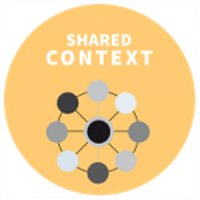
A context is our personal story, perception or experience that frames the way we think and act. In groups the collective context, a coherent and shared ‘big picture’ of results and approach, stimulates co-creation and the willingness to participate.
The success strategy: We all recognize the big picture and we are willing to work together towards a collective outcome. We can discuss this factor using the following success markers: Shared vision, Coherent overview, Interdependencies, Motivating outcome and Translate big picture
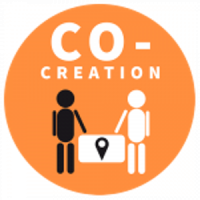
Co-creation is about synergy between interdependent professionals. It is a high performance way of collaboration, based on presence, agility and a seamless flow of ideas, information and activities.
The success strategy: Work together, be powerful and smart. We inspire each other and we proactively align towards achieving sustainable results. We can discuss this factor using the following success markers: Who knows what, Proactive alignment, Seamless flow, Inspire each other and Improve together
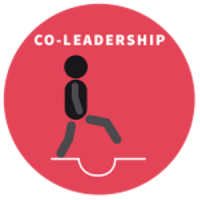
Personal leadership, feeling empowered to take initiative, is one of the key factors for achieving an integrated and sustainable outcome.
The success strategy: Take initiative. We inspire others by example to engage and to interact towards an integrated and sustainable outcome. We can discuss this factor using the following success markers: Feel empowered, Take the lead, Group focus, Social interaction and Generative mindset
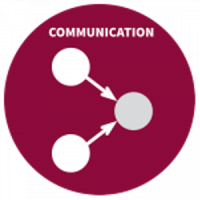
Interpersonal communication is the most important success factor for any group of people. When the quality is high it creates a common and practical frame of reference for the task at hand. When the quality is poor the chance of rework and frustration increases.
The success strategy: Be fit and tune in. We connect to each other and include mutual thoughts and feelings into new information and meaning. We can discuss this factor using the following success markers: Openness, Empathy, Mutual understanding, Practical translation and Shared meaning
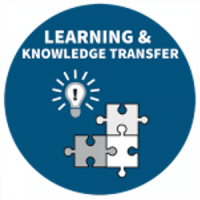
Teams that want to achieve a sustainable outcome need to learn in order to adapt to the dynamic world in which information and interdependencies constantly change. Collective learning, transferring knowledge about dependencies and the root cause of problems, increases the collective ability to anticipate to future events.
The success strategy: Anticipate by learning together. We share and apply our knowledge and experience into our daily practice in order to better anticipate to future challenges and situations. We can discuss this factor using the following success markers: Improve daily work, Anticipate, Root cause, Knowledge transfer and Learn together
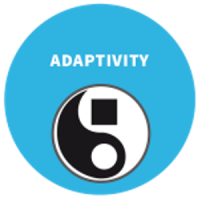
New situations might require another approach. Both as a person and a a group we need ‘to make a new path’ of thinking and doing. That an a healthy interaction between people facilitates the group flexibility and its ability to adapt to unforeseen situations and events.
The success strategy: Think big & act agile. When needed we facilitate a well-balanced change of underlying systems, structures and mindsets. We can discuss this factor using the following success markers: Energized, Resources, Healthy balance, Agility and Optimal control
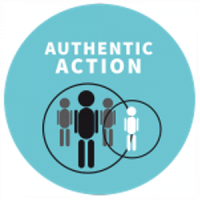
Authentic Action comes from the core of our beliefs and being and contributes to the world around us. Our motivation increases when we focus on how our personal actions connect to and contribute to the bigger business ecosystem that we are a part of.
The success strategy: Focus on added value. We balance personal and collective choices in line with the bigger business ecosystem that we feel a part of. We can discuss this factor using the following success markers: Personal contribution, Choose from a whole, Balanced values, Individual priorities and Improve interaction
Rien van Leeuwen gaat in op basiscondities voor duurzame verandering.
Aan de hand van praktijk-cases verkennen we de barrières bij het bereiken van duurzame doelen op strategisch, tactisch en operationeel niveau. Denk hierbij aan bestaande structuren en opvattingen, maar ook aan het niet kunnen duiden van negatieve en positieve impact.
We delen onderling de best practices en interventies die anderen activeren. Uiteindelijk draait elke verandering om een andere manier van interactie.
Rien van Leeuwen gaat in op basiscondities voor duurzame verandering.
Aan de hand van praktijk-cases verkennen we de barrières bij het bereiken van duurzame doelen op strategisch, tactisch en operationeel niveau. Denk hierbij aan bestaande structuren en opvattingen, maar ook aan het niet kunnen duiden van negatieve en positieve impact.
We delen onderling de best practices en interventies die anderen activeren. Uiteindelijk draait elke verandering om een andere manier van interactie.